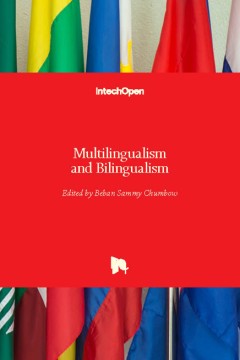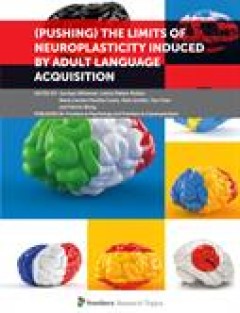Filter by

Multilingualism and bilingualism
Research in the area of bilingualism and multilingualism invariably produces fascinating insights. In the Europe of yesteryears, the paradigm of one nation one language was dominant and fashionable as a nation-building ideology that multilingualism was considered a curse, a demon that had to be exorcised. Today, the avalanche of empirical evidence of research findings has established multilingu…
- Edition
- -
- ISBN/ISSN
- 9781838813321
- Collation
- 184 p.; 23 cm.
- Series Title
- -
- Call Number
- 306.449 MUL m

The Limits of neuroplasticity induced by adult language acquisition
Most adults attempt to learn a second or even third language at some point in their life. Since language exposure is one of the most intense cognitive training regimes one can encounter, it is not surprising that previous research has shown that multilingualism can induce profound change in the brain or ‘neuroplasticity’.What remains unclear is the scope of such adult language learning indu…
- Edition
- -
- ISBN/ISSN
- 9782889456406
- Collation
- 157 p.; 22 cm.
- Series Title
- Frontiers Research Topics
- Call Number
- 306.446 PAB l
Phonology in the bilingual and bidialectal lexicon
A conversation between two people can only take place if the words intended by each speaker are successfully recognized. Spoken word recognition is at the heart of language comprehension. This automatic and smooth process remains a challenge for models of spoken word recognition. Both the process of mapping the speech signal onto stored representations for words, and the format of the represent…
- Edition
- -
- ISBN/ISSN
- 9782889452101
- Collation
- 185 p.; 23 cm.
- Series Title
- Frontiers Research Topics
- Call Number
- 414 DAR p

Developmental, modal, and pathological variation linguistic and cognitive pro…
One significant area of research in the multifaceted field of bilingualism over the past two decades has been the demonstration, validation, and account of the so-called ‘bilingual advantage’. This refers to the hypothesis that bilingual speakers have advanced abilities in executive functions and other domains of human cognition. Such cognitive benefits of bilingualism have an impact on the…
- Edition
- -
- ISBN/ISSN
- 9782889456383
- Collation
- 179 p.; 23 cm.
- Series Title
- Frontiers Research Topics
- Call Number
- 404.2 DEV d
 Computer Science, Information & General Works
Computer Science, Information & General Works  Philosophy & Psychology
Philosophy & Psychology  Religion
Religion  Social Sciences
Social Sciences  Language
Language  Pure Science
Pure Science  Applied Sciences
Applied Sciences  Art & Recreation
Art & Recreation  Literature
Literature  History & Geography
History & Geography